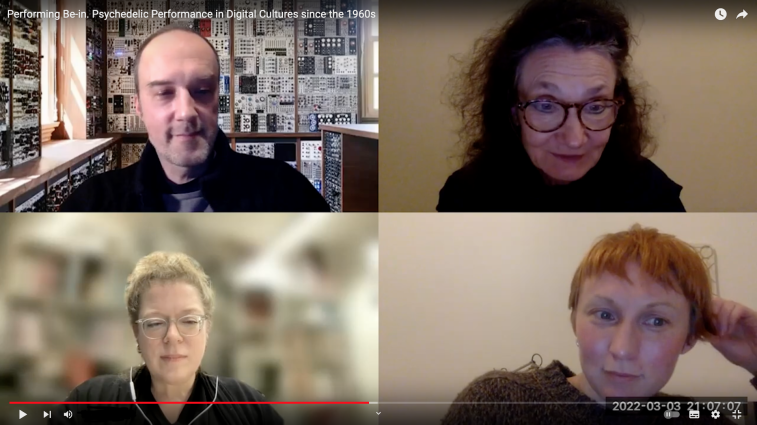The Respectful Nettheatre Channel
Performing Be-in. Psychedelic Performance in Digital Cultures since the 1960s.
Gespräch mit OMSK Social Club, Inke Arns und Martin Donner

OMSK Social Club – described as “empathy training camp“, working in collaborative and immersive sessions on speculations of other world-orders.
Inke Arns, curator and directrice of Hartware Medienkunstverein Dortmund, running currently the exhibition Technoshamanism till march 2022.
Martin Donner, scholar in media studies and cultural education, University of Erlangen-Nürnberg, AND an award-winning electronic composer, specialist for psychedelic concepts and practices within the countercultural neo-avantgarde in the 1960s.
The episode was hosted by Martina Leeker, a scholar in media and theatre studies, and a performer.

About the talk:
Performing Be-in leads a fascination-history of digital cultures. A significant and vivid example for performing Be-in is the performance-group and commune USCO, founded in the early 1960s by the poet Gerd Stern, in the USA. USCO came up with the notion of Be-in, describing their immersive and psychedelic multimedia shows, using colourful flickering lights, rapid image projections, electro-acoustic sounds and symbols of Buddhism. The effects of these performances were described in the Live Magazine in 1966 as drug-like trip experiences, lifting into a, as it goes: “state of heightened consciousness”.
For USCO the Be-in stood for producing a togetherness of the participants, in which they should experience themselves as part of a larger whole, being connected to everything through a common swinging on the deepest psycho-physical levels. Furthermore, USCO had very clear ideas concerning the political impact of their psychedelics. They should lead to an anti-authoritarian form of socio-political organization, in which all people are – enabled by technology - together freely, and without any kind of political, moral, or physical suppression and hierarchies. This was materialized also by a larger movement in the US-American Hippy-counter-culture, which withdrew – as USCO did - to the countryside, building communes.
In today’s ubiquitous and pervasive digital cultures we see again performances of this desire for techno-human be-ins. The artistic work of OMSK Social Club is a significant and brilliant example. For better understanding, we propose to think about two questions: Does, and if yes, in which way today’s performing be-in relate to its pre-history? And: Which role might contemporary performing be-ins have within the totalizing connectivity of today’s digitality?
An important reference to discuss these question is the research if media scholar Fred Turner, exploring, that counterculture built a specific combination of individualism and a regime of exclusion. The starting point is, that the performing be-in is also a social form, executed by a white middle class, living in communes, excluding diversity and equality, organising themselves around leaders, and fixing women in traditional functions of care. The effect is, that the fight against authoritarian structures, and unequal sociality provoked the very same. Following Fred Turner, a mentality of using technology, instead of politics, to solve problems, came up with this exclusive and techno-philic socio-setting, preparing a hubristic worldbuilding individual, the technophil new right wing movement in the USA, as well as the technocratic spirit of Silicon Valley.
Fred Turner: Website, On psychedelics and Silocon Valley, On counterculture.
The challenge, and – at the same time - the chance is, that the fascination-history is full of ambivalences, which is constitutive for digital cultures’ conversion into techno-human entanglements: On the one side the be-ins may enable a mentality for more equal societies, and evoke modesty for the ruined mother earth by opening up people’s mind for a deep togetherness. On the other side they may lead to an adaption to the techno-human co-operativity in digital cultures, making human voluntary and obedient givers-of-data for AI, and assistants for care-technologies.
This episode is part of the series: Thinking about Performing Digitality of The Respectful Nettheatre Chanel




Kommentare
Es wurde noch keine Kommentare eingestellt